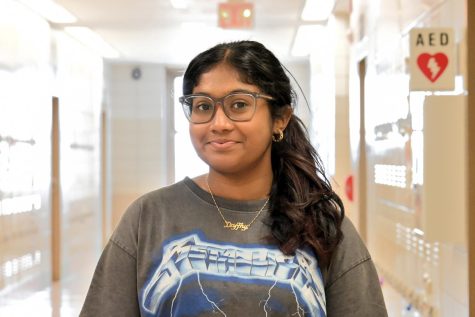
TikTok, the viral social media platform, takes up a significant portion of the lives of Harrisites who use it. While users can pick up various pieces of advice and tricks from scrolling through their feeds on TikTok, including recipes and TV show recommendations, they are also enveloped by unrealistic societal beauty standards.
Students have expressed that it is no secret that TikTok trends, from revealing side profiles to body shapes, have impacted its many impressionable young users. The disturbing hourglass trend showcases young girls demonstrating how to get abs by wearing plastic wrap around their stomachs. Junior Maimuna Muntaha said this trend “broke my heart as I never realized how many children see these unrealistic beauty standards and want to be like their favorite TikTok influencers.”
Unrealistic beauty standards can have detrimental effects on all people and their body image, especially developing children and teenagers. A study conducted by Bradley Hospital, Butler Hospital, and Brown Medical School found that one-third of inpatient adolescents are notably more ill than other patients because they struggle with poor body image. In the United States alone, the number of individuals that will be diagnosed with an eating disorder sums up to be 9% of the population. In addition, approximately 35 to 37 percent of adolescent girls take diet pills, laxatives and take many other harmful actions in order to lose weight.
Many students expressed the sentiment that creators and users of TikTok have perpetuated the concept of an ideal body image in young children and teenagers by planting insecurities in banyone that looks different. Senior Natalia Gierlachowski said that many of the trends “push viewers to compare themselves” to the social media standards of what constitutes being ‘pretty.’ The app itself has not done anything to prevent young children from viewing this kind of content except implementing an age check when someone first downloads the app. However, anyone can easily lie about their age to get around this feature.
Freshman Jenna Diaz states “I’m always catching myself trying to change something about how I look to try and look like one of the gorgeous girls that popped up on my For You page.” Many other students agreed that TikTok has caused them to compare themselves to others. Senior Aliyah Ghany said, “In general, I would say [that] TikTok has made me a lot more critical [about] my own body, and [I’ve] noticed ‘flaws’ that I never even thought about before I had the app.”
While some students have had negative experiences with Tik Tok, others have had mixed feelings regarding the standards put out on the platform. “It really does go both ways, because in general, I do feel more confident due to the makeup and style freedom TikTok expresses,” said sophomore Kylie Gavlin. “The trends sometimes hype up features that are typically put down in society.”
Senior Victor Shemper agreed, and said that he could use TikTok as educational research with”various videos that inspired me to drink more water…[and] many tips on working out.”
Social media can be both a curse and a blessing. As junior Shaddai Jemmott put it, “everyone is a unique individual, and it’s important to embrace this and learn to love yourself despite what society dictates.”






























